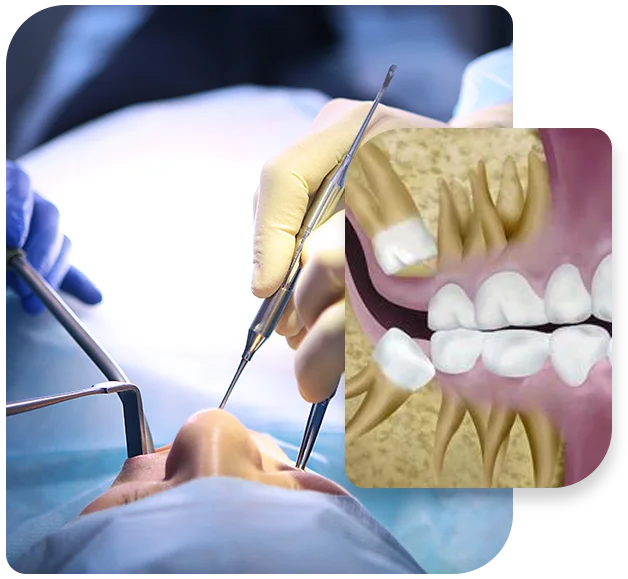Wisdom Teeth
Wisdom Teeth
Understanding Wisdom Teeth
By the age of eighteen, the average adult has 32 teeth — 16 teeth on the top and 16 teeth on the bottom. Each tooth in the mouth has a specific name and function. The teeth in the front of the mouth (incisors, canine and bicuspid teeth) are ideal for grasping and biting food into smaller pieces. The back teeth or molar teeth are used to grind food up into a consistency suitable for swallowing. The average mouth is made to hold only 28 teeth. It can be painful when 32 teeth try to fit in a mouth that holds only 28 teeth. These four other teeth are third molars, also known as “wisdom teeth.”

Why Should I Remove My Wisdom Teeth?
The extraction of wisdom teeth is necessary when they are prevented from properly erupting within the mouth.
These poorly positioned impacted teeth can cause many problems. When they are partially erupted, the opening around the tooth allows bacteria to grow and will eventually cause an infection. This can result in swelling, stiffness, pain and illness.
The most serious problem occurs when tumors or cysts form around the impacted wisdom tooth, resulting in destruction of the jaw bone and healthy teeth. Removal of the offending impacted tooth or teeth usually resolves these problems. Early removal is recommended to avoid such future problems and to decrease the surgical risk involved with the procedure.
Precision and Expertise
Specialized Skills & Professional Care for Oral Surgery
Oral Examination
With an oral examination and x-rays of the mouth, Dr. Patel can evaluate the position of the wisdom teeth and predict if there may be present or future problems. Studies have shown that early evaluation and treatment result in a superior outcome for the patient. Patients are generally first evaluated in the mid-teenage years by their dentist, orthodontist or by an oral and maxillofacial surgeon.
All outpatient surgery is performed under appropriate anesthesia to maximize patient comfort.
Wisdom Tooth Removal / Extraction
In most cases, the removal of wisdom teeth is performed under local anesthesia, laughing gas (nitrous oxide/oxygen analgesia) or general anesthesia. These options as well as the surgical risks (i.e. sensory nerve damage, sinus complications) will be discussed with you before the procedure is performed. Once the teeth are removed, the gum is sutured.
Empower Your Oral Health
Schedule a Wisdom Teeth Consultation with Dr. Patel Today!
We encourage you to schedule a consultation with Dr. Patel to learn about treatment for impacted wisdom teeth. To find out more about treatment options, contact Piedmont Oral Surgery & Dental Implants at (404) 947-8399.

